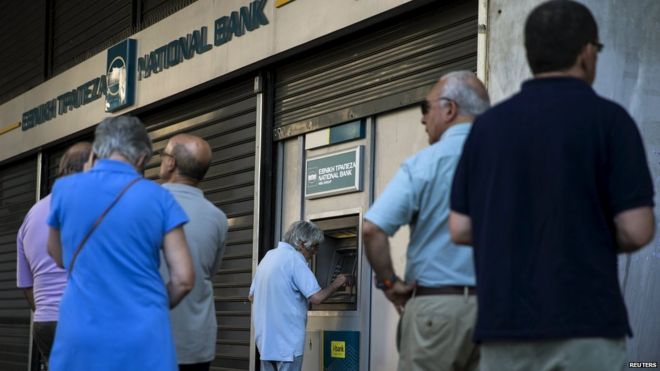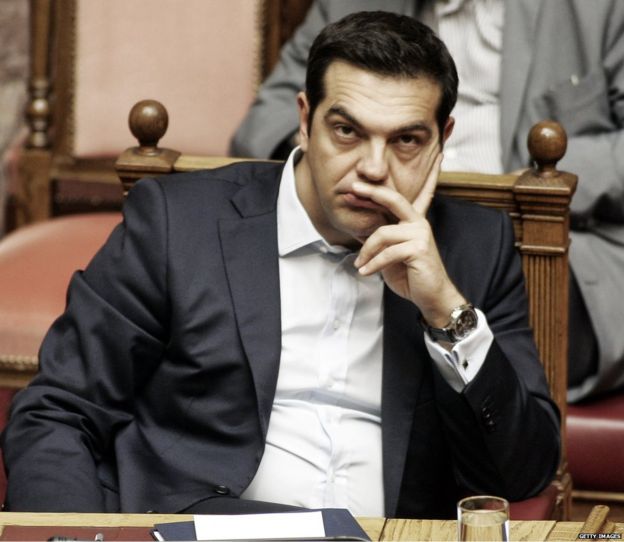Greece debt crisis: ECB 'to end' bank emergency lending
http://www.bbc.com/news/world-europe-33303105

The European Central Bank is expected to end emergency lending to
Greece's banks on Sunday, the BBC understands.
Well-placed
sources told BBC economics editor Robert Peston a decision
to end the Emergency Liquidity Assistance (ELA) would be made by the ECB's
governing council later on Sunday.
Greek banks depend on ELA.
Cutting the lifeline could push Greece out of the euro. Some analysts
have tweeted that the ECB is likely to cap, but not end, the ELA.
And French Prime Minister Manuel Valls said the ECB "is independent
but... I don't think it can cut off rations [for the Greeks]". He said
"it's the Greek nation that is suffering".
Greece will probably have to "announce a bank holiday on Monday,
pending the introduction of capital controls", our economics editor says.
The bailout for heavily indebted Greece expires on Tuesday and talks
have broken down.
Greek banks would find themselves in serious straits as soon as Monday
if the ECB went ahead and cut the lifeline, our economics editor says.
It is one of the most momentous decisions the ECB has ever faced, since
the euro was launched on 1 January 1999.
Capital controls are restrictions on how much customers can withdraw
from banks. Until now, the Greek government has signalled that it does not want
to impose such controls.

In recent weeks, Greeks have withdrawn billions of euros from banks, and
long queues formed at cashpoints on Saturday, amid fears that banks would not
open on Monday.
The ECB has been sending emergency funds on a daily basis to the Greek
central bank, which then allocates it to the high-street banks.
Grexit risk looms
A withdrawal from the euro - known as "Grexit" - is not
inevitable, says our editor, as the eurozone did resolve Cyprus's banking
crisis in 2013 and the country stayed in the euro.
Capital controls were imposed on
Cypriot banks, and remained in place for a long time - the last restrictions
were only lifted in April this year.
Greece's situation is more difficult, Robert Peston reports. Capital
controls are seen as an important step towards leaving the euro, because the
single currency's rules require free movement of capital.
But Greece could remain in if its government and the bailout providers -
the EU and IMF - can restart constructive negotiations, he reports.
A country on the brink - chief
correspondent Gavin Hewitt writes:
It is the most important decision in the ECB's history.
A withdrawal of funding could plunge Greece into chaos and yet the ECB
cannot break its own rules by funding a banking system where the country is
heading for a default.
Alexis Tsipras has gambled both with his future and that of his country.
He committed Greece to a vote, but only after the current bailout has expired,
so leaving Greece vulnerable and exposed.
Read Gavin's analysis in full here.
On Saturday eurozone finance ministers - the Eurogroup - refused to
extend Greece's desperately-needed bailout beyond Tuesday.
The ministers blamed Greek Prime Minister Alexis Tsipras's surprise call
for a referendum on 5 July on the bailout conditions.
Economic
pain
Under the rules governing the euro, the ECB's emergency lifeline
could not be continued if the ECB considered Greek banks to be insolvent.
Robert Peston says that with Greece no longer participating in a
formal rescue programme, the solvency of the Greek state would be in doubt, as
it is so intimately linked to the banks' solvency.
Mr Tsipras's leftist Syriza government rejects the bailout
terms, after five years of lender-imposed austerity that has increased Greek
unemployment and cut pensions and welfare benefits.
Greece has endured five years of recession, and total output
(GDP) has shrunk by 25%.
Comments